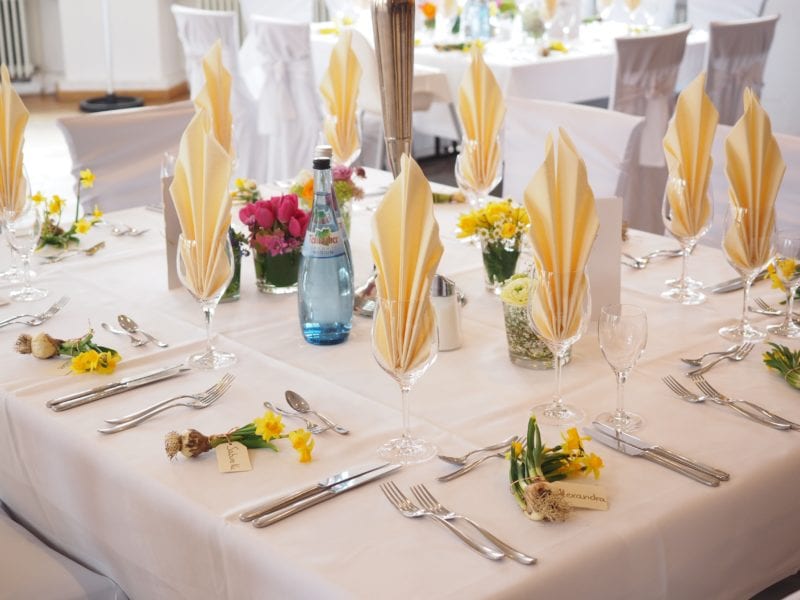If you’ve ever planned a wedding, corporate event, or even a large birthday party, you probably know that party planning is no easy feat. There are a lot of moving parts leading up to the event, and just as many on the day of the event.
The verdict is in; event planning is on the rise. More people are entering the industry than ever before, and more people are hiring party planners to plan their events.
If you’re wondering what a party planner does, how you can hire one, or how you can become one yourself, you’ve come to the right place! We’re covering all of that in this post.

What is a Party Planner?
The job of a party planner, or an event planner, is pretty much just as it sounds – to plan parties and events. Whether it be a wedding, a birthday party, or a corporate event, party planners are there to make the planning and the event itself run more smoothly.
So what exactly does the party planner do?
Learn About The Event
First things first, a party planner sits down with clients and potential clients to learn more about the event and gauge the details. This gives them the information they need to dive into planning your event. But it also provides the party with planner an idea of whether they would be a good fit for your event.
Guide Big Picture Planning
An event planner helps to nail down the big-picture details of the event such as the theme, the date, and the budget. Those big-picture details will help guide them when it comes to the smaller details.
Whether it be a wedding, a birthday party, or a corporate event, party planners are there to make the planning and the event itself run more smoothly.
Manage the Budget
Most people don’t have an unlimited budget to spend on their events, and a party planner will be cognizant of that. They help to make sure the event is coming in on budget and can help to figure out where the money is best spent.
Coordinate with Vendors
For a more significant event like a wedding, the event planner isn’t the only vendor. They'll also likely be juggling a caterer, a band or DJ, a florist, etc. The planner can step in and help to coordinate all of the different vendors and can communicate with each of them on the day of the event.
Day-Of Coordination
Depending on the size of an event, the day-of can often be chaotic and stressful. Most event planners offer day-of coordination services, whether it’s included in their fee or available for an extra cost.
On that day they may help with set-up and decorations, and help coordinate people and vendors.

How to Find the Perfect Party Planner
If you’re planning a party or event, but the logistics of event planning seem daunting to you, you might be considering hiring a professional party planner to take over the reins. By following just a few simple steps, you can make sure to find the perfect person to plan your event.
Consider the Type of Event
Narrowing in on what type of event you’re planning will be the first big question to answer when it comes to hiring a party planner. This is because different event planners are going to have different specialties.
The person you would hire as your wedding planner is probably not the same person you would hire to plan a child’s birthday party. Likewise, if you’re planning a corporate event or retreat, you’re going to be seeking out a planner who specializes in that type of event.
Once you’ve decided what type of event you’ll be hosting, you’ll be able to narrow down your search.

Create a Budget
Before meeting with any prospective party planners, it’s best to have a budget in mind so you can communicate that to the planner. Some planners will be more or less equipped to handle events of certain budgets. Being upfront about that information is in the best interest of everyone involved.
The other benefit of knowing your budget beforehand is that an event planner will be able to clue you into whether your budget is realistic based on the type and size of event you are planning.
Keep in mind that when you hire a party planner, you’re no longer just budgeting for the event itself, but for payment for that individual or company as well.
The national average for the cost of party planning services ranges from $500 to $750.
Here are a few other factors that will go into determining the cost of your event:
- Region: Areas with a higher cost of living are likely to result in higher event costs.
- Number of Guests: In general, you can expect that more guests will result in higher costs due to the increased costs of food and beverages.
- Complexity: The complexity of the event you’re planning is going to play a big part in determining the cost. A child’s birthday party that only lasts a couple of hours will be far less complex than an all-day event that is broken into multiple sections and requires a handful of vendors.
Ask About Their Scope of Services
Before hiring someone to plan your event, you’ll definitely want to nail down the scope of their services. Not all party planners will offer the same services for the fee provided, and it’s essential to determine exactly what you’ll be getting from your event planner.

Here are a few things you’ll want to keep in mind:
- Type of Fee: First things first, you’ll want to determine what type of fee your event planner charges. Do they charge a flat fee for all of their services? Or do they charge an hourly fee, meaning you’ll pay more if you need more help during the planning process?
- Services Before the Event: When you’re hiring a party planner, you’ll want to nail down precisely what services they provide leading up to your event. Do they help you manage your guest list? What about finding vendors? What level of communication can you expect between the day you hire them and the day of your event?
- Day-Of Coordination: The final piece of the puzzle when it comes to hiring an event planner is the services they offer on the day of your event. Some vendors may only help with the planning lead up to the event, but not provide any services on that day. Some may include day-of coordination in their fee, while others may offer the service, but with an additional fee.
It will be to your advantage to know ahead of time what you’re looking for in a party planner. That way when you start reaching out to potential vendors, you can eliminate anyone that won’t be able to meet your needs.

Check References
Once you’ve narrowed down your party planner search to those who really meet the needs of your event, make sure to ask for references from previous clients to get an accurate idea of the quality of their work.
If you heard about the party planner through word of mouth, then it will be easy to refer back to someone who can share their experience.
If you found your party planner online, you can ask them to share a few references. Most business owners will be prepared for this and will have a few recommendations or reviews readily available!
Know the Contingency Plan
As with any other event vendor, you might hire, you want to know your event is protected.
First of all, this means making sure the vendor you hire has their own liability insurance.
Additionally, know what the planner’s contingency plan is. What if they’re supposed to be there on the day of the event, but comes down with the flu at the last minute? Are you providing someone to take their place?
What about a refund policy in the event that either you or your event planner have to cancel?
Best case scenario, you find the perfect party planner and everything goes exactly as planned. But you always want to be prepared in case something goes wrong.
Make Sure the Personality is a Fit
Yes, you want to make sure the person you hire can do the job well. But personality should be a factor as well. For larger events, you may be in the planning stage for upwards of a year, and that is a long time to work with someone whose personality doesn’t mesh well with yours.
Ultimately you want the person you hire to be someone you trust and feel comfortable with.
How to Become a Party Planner
Maybe you aren’t in the market for hiring an event planner but are considering party planning as a career. If this is the case, you wouldn’t be alone. According to the Bureau of Labor Statistics, the number of event planners is on track to grow 11% between 2016 and 2026, which is faster than average for most occupations.
26% of couples in 2016 hired a wedding planner, up from just 19% in 2010.
In addition to the growing number of employed wedding planners, the number of people hiring them is growing as well. According to a survey from The Knot, 26% of couples in 2016 hired a wedding planner to plan their big day. That number was 19% just six years earlier.
Like any other career, party planning requires it’s own set of skills and considerations and has its fair share of pros and cons, and there are some things you’ll want to keep in mind.
Degree and Background
You might be wondering what needs to be on your resume to qualify for a career in event planning.
According to the Bureau of Labor Statistics, the typical entry-level education needed is a Bachelor’s degree.
Historically no specific type of degree was required, but as the industry grows, requirements will probably become more stringent. Degrees such as hospitality management and public relations will have a big leg up over other degrees.
As far as career background, working at smaller events or working at events in a different capacity would give you the experience to bring to the table when seeking out party planning gigs.
If an applicant’s degree is not related to hospitality management, employers are likely to require at least one or two years of related work experience. – Sokanu (career-matching platform)
Self-Employment vs. Company
One of the biggest questions you’ll face in your career as a party planner is whether you’ll take a job as a party planner for an existing event planning service, or whether you’ll venture out on your own and take a stab at self-employment.
Both options certainly offer pros and cons.
As with most industries, working for someone else as an employee offers more job security than starting your own event planning service. However, your earning potential working for someone else likely isn’t as high as owning your own business.
When it comes to job responsibilities, working for someone else can help you ease into the industry and get your feet wet. You likely won’t start off coordinating entire events yourself, but rather working on a team or assisting someone else with the planning.
Working as an independent party planner, however, means tackling the entire event from top to bottom yourself.
In the end, it comes down to personal preference and whether or not you think self-employment is right for you.

Salary
According to the Bureau of Labor Statistics, the average salary for an event planner in the United States is $48,290, or $23.22 per hour.
What exactly goes into this number though?
Obviously, you can expect that income would increase as skills and experience increase, but there are undoubtedly other factors that go into it as well.
First of all, the region plays a big factor. As you enter areas with a higher cost of living, the cost of events and event planning increases, and so does the salary of event planners. Sokanu user data also shows that nearly 40% of party planners only do so part-time, which will factor into the salary average.
Finally, as discussed above, party planners will have the option of taking a job with an existing event planning service, or venturing off on their own – and that will have an impact on salary.
Overall, according to October 2018 data from the Bureau of Labor Statistics, party and event planning comes in just above the national median average salary of $46,124 ($887 per week).
“The average salary for an event planner in the United States is $48,290.”
3 Tips for Becoming a Party Planner
Now that you know the basics on what background you might need and what your earning potential is, there are a few extra tips you can follow to help you jumpstart your career as a party planner!
1. Start Getting Event Experience
Even if you haven’t started working as an event planner just yet, you can get your foot in the door by getting event experience in other ways and working your way up.
This might include working for another vendor who does events, such as a catering business. You could also find a job working at an event venue working in a different type of position in the hopes of moving into event planning.
You’ll get your foot in the door, and down the road when you do start event planning, you’ll be able to show clients that you do have some event experience.

2. Narrow Down Your Specialty
When you’re just starting in the industry, you might be tempted to take any business that comes your way. And while that helps pay the bills at first, being a jack of all trades isn’t the easiest or most profitable solution in the long run.
Here are some things to keep in mind when you’re narrowing down your specialty:
- Why did you decide to become an event planner? Maybe you specifically love weddings and want to be a wedding planner? Then you’ve got your answer!
- Do you like working with kids? Families? Corporations? Young couples?
- What size events do you want to plan?
- How will these events fit into your life? For example, being a wedding planner likely means being away from home every Saturday night.
3. Grow Your Network
So much of the event planning industry runs on word of mouth. It might be individuals recommending their favorite event planner to a friend. Or it might be a venue which has a select few event planners they always recommend to their clients.
Getting your name out there and showing people you’re trustworthy, and a hard worker will help spread the word about your business.

Whether you’re hiring an event planner or trying to become one, this guide is a great resource to getting started.
One thing is clear: the event planning industry is thriving. With faster growth than most industries and a higher than average median salary, it’s certainly a great field to be getting into.
And that means that when it comes time to plan your next party, you’ll have plenty of options when choosing a party planner!
And if you’re getting ready to plan a party, our collection of party planning posts can help you get started!



